NEWS
2023 Women’s Leadership Conference at Davidson College
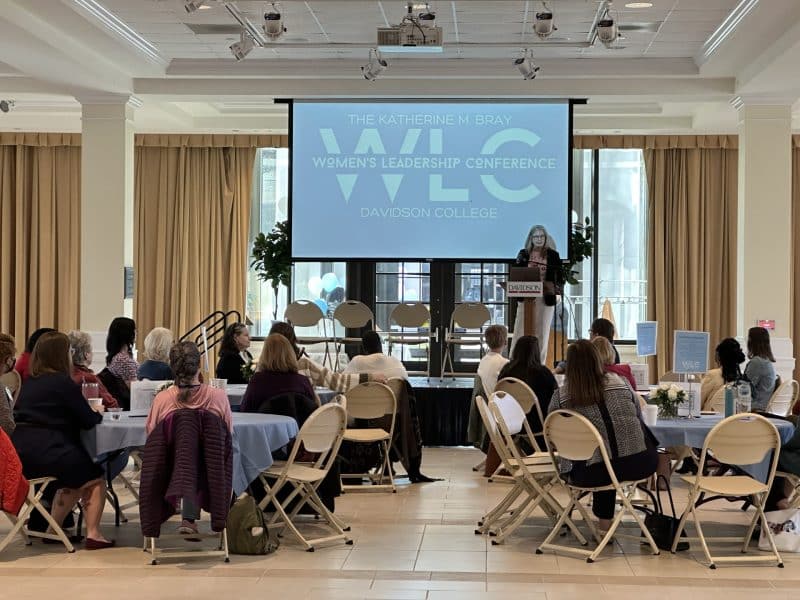
Conference namesake Katherine M. “Kathy” Bray provided opening remarks.
Following a multi-year COVID disruption, the thirteenth Women’s Leadership Conference was held Saturday morning at Davidson College. Renamed the Katherine M. Bray Women’s Leadership Conference in 2016
Davidson students, faculty, staff, and members of the community gathered in the Lilly Family Gallery for the conference entitled: “Rights, Resilience, and Reproduction.”
Student organizers of the conference described their intent in the following:
The Katherine M. Bray Women’s Leadership Conference provides women with an interactive, intergenerational exploration of 21st century leadership. We hope that during this conference you, as a participant, learn from speakers, engage in workshops, and have meaningful conversations. Our mission is to build a culture that supports women leaders at Davidson College and in our community through the exploration of a wide range of strategies for effective leadership, the examination of current issues surrounding leadership, and the development of a network for women leaders.
After the overturning of Roe v. Wade in June, we think this year’s theme, “Rights, Resilience, Reproduction,” is more relevant than ever for women, girls, transwomen, and gender non-conforming people. We believe in the importance of focusing on the intersection of topics such as reproductive justice, birthing justice, and gender-based violence. Standing up for what we believe in and our rights is inherently leadership. And as a committee, we believe that empowered women make the best leaders.
Davidson alumna, and conference namesake, Kathy Bray ’85, provided welcoming remarks. She was followed by the 2023 WLC Committee Chair Alona Webb-Newton.
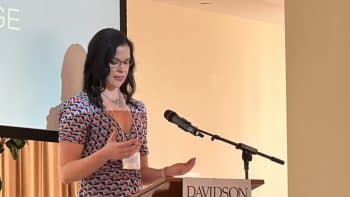
Katey Zeh ’05 was the morning keynote speaker.
The morning keynote speaker was Katey Zeh, a member of the Davidson class of 2005. An ordained Baptist minister, she is the CEO of The Religious Coalition for Reproductive Choice. Zeh told the attendees the 50-year old organization, founded by clergy and lay leaders from mainline denominations, followed the Roe decision in 1973.
She spoke to the audience about the impacts on her work post-Roe and the Dobbs decision.
While her remarks highlighted the challenges and crises of working in this space at this time, she ended with words of challenge and hope. “We have to hold to and attend to the suffering of the now. . .and the liberatory vision for the future of what we want to build in its place. If we do not know what we are creating, we risk reenforcing the systems that we are seeking to dismantle.”
Following Zeh’s remarks conference attendees split into groups to participate in “table conversations.” The topics and discussion leaders included:
- Kathleen Broussard – Reproductive Governance and Resistance: The Search for an Abortion in Restrictive Settings
- Melissa Gonzalez – Latina American Responses to Gender-Based Violence
- Carmen Green – The Intersection of Abortion Access, Birth Equity, and Reproductive Justice
- Heather McKee – Christian Ethics and Gender-Based Violence
- Annelise Mennicke – Effective Prevention Strategies for Gender-Based Violence
- Alise Powell – Black Reproductive Autonomy is in Jeopardy
- Georgia Ringle – Sexual Autonomy at Davidson: What Does Sexual Autonomy Look Like on the Davidson College Campus?
- Katey Zeh – White Christian Nationalism: A Driver of Reproductive Oppression
Each conference attendee had the opportunity to rotate through three different table sessions. Even when the formal table sessions ended, the intergenerational conversations continued during lunch.
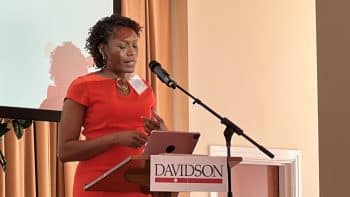
Anayah Ayoka provided the afternoon keynote.
The afternoon keynote was Anayah Ayoka, co-founder of Black Breastfeeding Week and co-editor of Free to Breastfeed: Voices from Black Mothers. The nurse midwife did her undergraduate work at Vassar and graduate work at Yale.
Ayoka’s entry into her work was personal. As a black woman, she sought information and advice about breastfeeding. She shared the crazy and depressing fact that when she initially conducted an internet search about black breastfeeding that the results were heavily populated with pornography. She helped create Black Breastfeeding Week to generate awareness of black maternal mortality and infant mortality rates. Black infant mortality rates are double the national average, and black women are three times as likely to die in childbirth. Those are national averages, while in many states the rates are even higher.
Black Breastfeeding Week is intended to open conversations in communities. She noted that conversations are a vast communication improvement over the generic government-produced pamphlets.
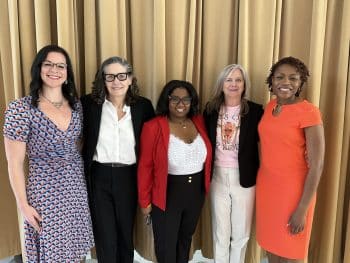
(L-R) Katey Zeh, Heather McKee, Conference Chair Alona Webb-Newton, Kathy Bray, and Anayah Ayoka.
Ayoka highlighted the success in their efforts by noting that their efforts led to the creation of Indigenous Milk Medicine Week, Asian American, Native Hawaiian, and Pacific Islander Breast Feeding Weeks.
The final event of the conference was a panel discussion moderated by Committee Chair Alona Webb-Newton. The panelists included Anayah Ayoka, Heather McKee, and Katey Zeh. They began with providing longer personal introductions that framed some of the subsequent questions from the audience.
Following the conference, Zeh went to Main Street Books. She held a book signing with her latest book: A Complicated Choice.
See some of our News of Davidson photos and video clips from the conference at this link.
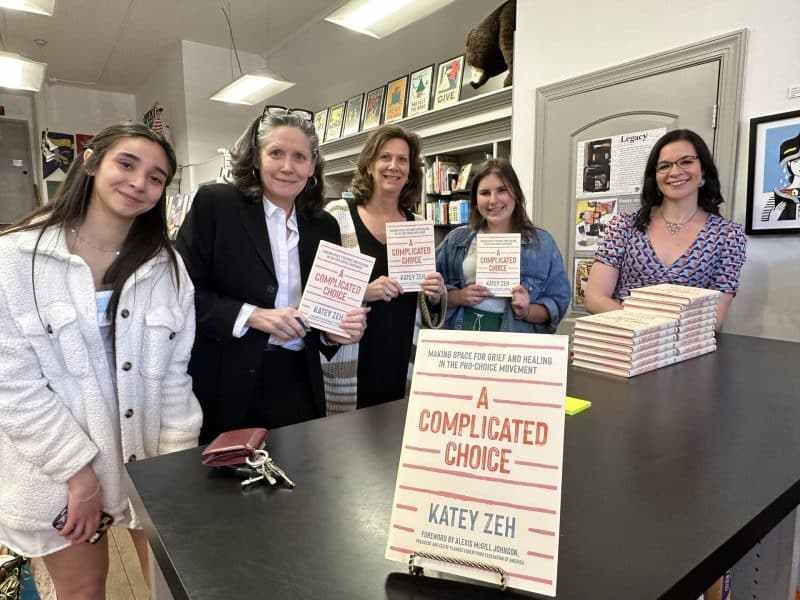
Following the conference Main Street Books hosted a book signing with Katey Zeh.
Editor’s Note: just one day after the presentation from Ayoka, NBC Nightly News aired a segment entitled “Black Women at Higher Risk of Dying in Childbirth.” Research into black mothers and maternal healthcare issues shows that healthcare for black mothers reflects racial vs. economic disparities. Most notably, “even the richest black women are more likely to die than the poorest white women.”
Dr. Kameelah Phillips, an OB/GYN, was interviewed for the segment and stated: “women of color, and particularly black women, are not receiving the same type of care – even in the same institutions.”
That segment ended with the following tips for pregnant black women:
- Identify your risk factors with your doctor
- Bring someone who can help advocate for you
- Take detailed notes


